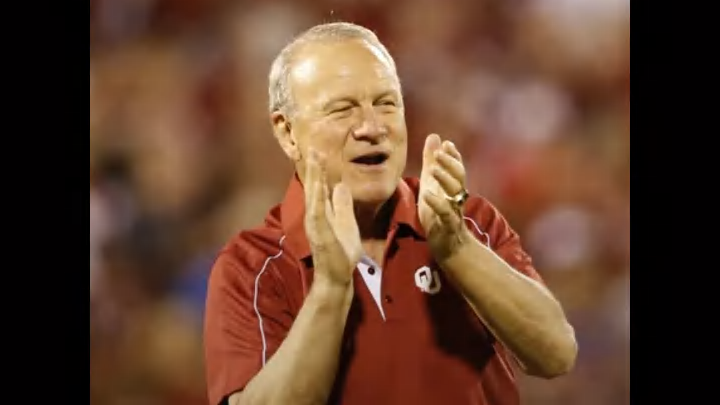Why Barry Switzer Says Oklahoma Can Compete for National Championships in the SEC

Barry Switzer isn’t exactly getting emotional about Oklahoma leaving the Big 12 Conference for the SEC on Monday.
In fact, some of his fondest memories actually center on the Sooners’ new league.
“I’ve always been a fan of the SEC,” Switzer told Sooners on SI. “When I grew up in south Arkansas, I listened to LSU and Tennessee games.
“I was listening out in the country in our little shotgun house on the radio and I’d get out there and listen on Saturdays in the car. No air conditioning, so we’d open all four car doors and turn on the battery radio in the car and listen to games.”
Like most in the Crimson and Cream camp, Switzer is excited but cautious about the Sooners stepping into the Southeastern Conference — a monumental shift at least five years in the making and one that becomes official at the stroke of midnight on July 1.
Unlike most, though, Switzer will be on hand at Mother Road Market on 11th Street in Tulsa on Monday, speaking to a gathering of Sooner Nation as part of OU’s two-day celebration of its new conference affiliation.
He told Sooners on SI that he’s looking forward to watching OU compete in the SEC, which has evolved over the last 20 years into a college football giant the likes of which the sport has never seen. The SEC has won 13 of the last 18 national titles since Florida began a seven-year streak with trophies in 2006 and 2008, sandwiched with LSU’s in 2007 and followed by Alabama’s in 2009, Auburn’s in 2010 and Bama’s in 2011 and ’12. Since then, Alabama (2015, 2017 and 2020), LSU (2019) and Georgia (2021 and 2022) have won it all.
Only Florida State (2013), Ohio State (2014), Clemson (2016 and 2018) and Michigan (2023) have interrupted the SEC’s stranglehold.
And adding OU and Texas only makes the SEC bigger and badder.
But Switzer — Hall of Fame coach, three-time national champion and Super Bowl winner — also tempers his excitement with a dose of reality.
“The SEC is the biggest, the strongest, the most gifted teams in the (NCAA),” he said. “You’ve seen that. All you gotta look at is the depth in the first and second and third rounds, all the damn linemen that they got in the (NFL) draft. They got them big-ass linemen, you know that. Defense and offense. They sort of dominate it.”
The Sooners’ projected win total in 2024 is just 7.5 — well below the standard that Bob Stoops re-established when he took over the program in 1999 and won the national championship in 2000 with a perfect 13-0 season.
According to Circa Sports, OU is currently an underdog in six of its eight SEC games this season: Tennessee, Texas, Ole Miss, Missouri, Alabama and LSU. (The Sooners also play South Carolina and Auburn. (Per ESPN’s FPI, OU’s 2024 schedule is the seventh-hardest in the nation, although some analytics have ranked it as high as No. 2 nationally.
“I looked it up today: we are an underdog against (almost) every SEC team we play,” Switzer said. “Vegas has got us an underdog against (almost) every SEC team we play. So you ask me what I think about stepping up into that league, it concerns you. Because there’s no gimmes there. We’ve got a tough conference schedule. And Tulane’s there. They’ll play your ass off. They played ours here. I don’t know anything about Temple and Maine. They don’t scare me. … But the rest of ‘em, there’s no gimmes, and after that, the SEC starts. You get through those three and you got Tennessee, you got Ole Miss and just one right after another. And so anyway, I think we’re not gonna be used to having those 9-, 10-win seasons. I think they’ll be hard to get. I think we’ll kind of be middle-of-the-pack.”
Switzer said continued success in recruiting can change that. Like it was with Switzer, landing the best players is the easiest way for Brent Venables to succeed.
“It has to be,” Switzer said. “And it has to be NIL. That’s what you’re really gonna compete against. It’s money. I don’t think I ever worry about us beating Texas again. Now, Texas is gonna raise more money than the University of Oklahoma can raise. Don’t you think they can? So if it comes down to that, it’s gonna be hard for us. It’s all NIL to make the difference to get the players.”
A lot of old coaches — Switzer and Stoops among the likes of Nick Saban and others — share similar sentiments about the current state of the game.
“I’m glad I’m not coaching today, all this NIL,” Switzer said. “You know what NIL stands for, don’t you? ‘Now It’s Legal.’ That’s surely true. No (kidding). Hey, what goes around, comes around. I’ve been recruiting since the ‘60s in Arkansas, and Oklahoma, I came here in the ‘70s and ‘80s. I know all about it. But yeah, it’s a different deal.”
Switzer said he doesn’t know enough about everyone’s current roster to comment on teams’ individual talent, but he knows enough to know the Sooners have work to do in the trenches.
Things are certainly looking up there. Gerald McCoy was the last 5-star defensive lineman OU signed in 2007, but Venables has landed two in the last two recruiting cycles.
But that mentality needs to go beyond just the defensive line, Switzer said.
“We lost all our offensive linemen,” he said. “We don’t have one guy returning. … But the key is the diversity in those states down there in Florida and all the way across Alabama and Mississippi and across Louisiana. The diversity of those states, they have all the population and they got all the big-ass linemen. A lot of great recruits. But we don’t. The diversity of Kansas is about zero. Nebraska is about 2, and Oklahoma is about 6. So you have to recruit nationally. I don’t think we can make a living going down to the SEC and getting kids out of the SEC. We haven’t been able to do it before. We’ve been able to recruit East Coast and West Coast.
“But, we’re gonna find out, aren’t we?”
Switzer also said he admired how Venables is building his roster from the inside out: an emphasis on linemen, and a further emphasis on defense.
“Oh yeah, always,” he said. “(Shoot), I always want defensive players first. Hell yeah. You know, you gotta stop their ass. Even though people score a lot today — and we’ll score a lot — you still gotta slow people down. You can give up 25-28 points and still be a hell of a defensive football team. Because everybody scores so damn much today.
“My teams were all defense first. My teams, back in the ‘70s, (shoot) I had eight starting in the NFL off my ’74 team, starting in the NFL after they were drafted. The Selmons, Jimbo Elrod, Randy Hughes, Tony Peters, Rod Shoate — I had so many play in the NFL, but nobody thinks about that. But we were damn good on defense.”
Similarly, Switzer’s juggernauts in the mid-1980s ran a dazzling wishbone offense, but also boasted the nation’s No. 1 overall defense and No. 1 pass defense in 1985, ’86 and ’87, the No. 1 scoring defense in 1986 and ’87, and the No. 1 rushing defense in 1984 and ’86.
In those days, OU and Nebraska ruled the Big Eight Conference. When Arkansas (and South Carolina) expanded SEC in 1992, that spelled the end for the SWC, and four members — Texas, Texas A&M, Texas Tech and Baylor — joined the Big Eight in 1996 to form the Big 12.
Now, after almost 100 years aligned with Big 12 schools — OU joined the Big Six in 1928, the Big Seven in 1948, the Big Eight in 1960 and the Big 12 in 1996 — the Sooners are leaving behind nearly a century of history.
And it’s been an amazing history.
Of OU’s nation-leading 50 conference championships, 47 — and all seven of the program’s national championships, and all seven Heisman Trophy winners — came during the Big Six/Big Seven/Big Eight/Big 12 era.
“(Shoot), I don’t think about that,” Switzer said. “I haven’t even thought about that. Television controls football today, money. Shoot, $75 million (a year) for OU to go to the SEC. I read in the paper the other day we’re at a million dollar deficit, the university. Athletics, that can’t be because we’re independent of the university. We have to pay for everything. …
“Just gonna wait and see. See if it’s a good move.”
Whatever comes of Oklahoma’s future in the SEC, Switzer will always be a fan. After all, he not only coached the program as offensive coordinator from 1966-72 and guided the Sooners to a 157-29-4 record as head coach — he used to listen to Bud Wilkinson’s history-making teams win week after week back home in Crossett, AR.
“The reason I was listening to Oklahoma, Tennessee and Oklahoma were the only major teams that didn’t have lights, so they played afternoon games all the time,” Switzer said. “Every Saturday. And Arkansas played night games. So I could get — I heard Merrill Green run the punt back against Colorado (with 36 seconds on the clock in a 1953 matchup) to keep the damn win streak going for Oklahoma at Boulder. Back in the ‘50s. When the streak started, I know that. But Oklahoma, I listened to them on the radio. Oklahoma was a big deal (even) back then.
“Those are the games I listened to on radio. That’s who I could get at the time. Obviously I listened to Arkansas, too, but we were Southwest Conference then. But I listened to SEC games. I always knew about their history and tradition — the (Bear) Bryants and (Robert) Neylands and all those guys. I remember when they were coaching. So I have a pretty good feeling about them. I was recruited by the LSU coach, Charlie McClendon. He was an assistant coach. Paul Dietzel was there until 1961.
“That was a long time ago.”
OU fans today might rather talk about the future — specifically whether the Sooners can join the SEC’s elite programs and, like LSU, Auburn, Florida, Georgia and Alabama, win a national championship in football.
“I don’t know why not,” Switzer said. “If we get the talent. Everybody needs talent. But, if we get in the playoff.
“… But here again, I’ll just have to say, we’ll find out.”
